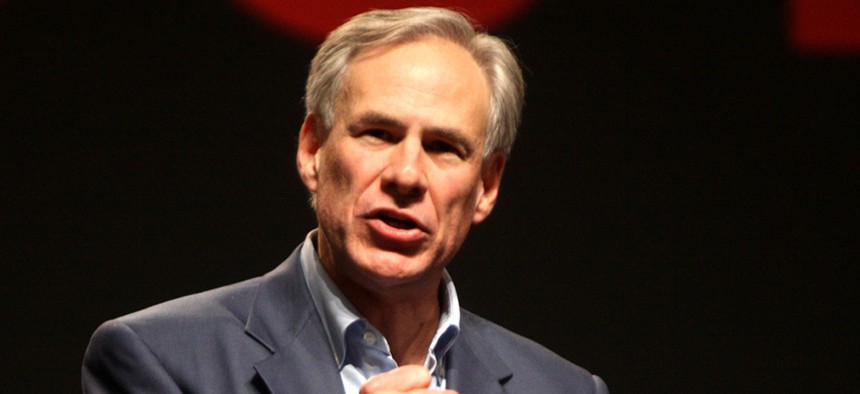
Flickr user Gage Skidmore
Texas Governor Calls for a Constitutional Convention to Cut the Federal Government's Power
Greg Abbott’s plan would give states authority to overturn federal law, Supreme Court ruling
Arguing that the federal government has “run amok” and trampled over states’ rights, Texas Gov. Greg Abbott on Friday unveiled a plan to overhaul the U.S. Constitution through a convention of the states.
Abbott, the first-term Republican, rolled out nine amendments that he said would “restore the rule of law in America.” Among them: prohibiting administrative agencies from creating federal law, requiring Congress to balance the budget, and allowing a two-thirds majority of states to override a Supreme Court decision, federal law, or regulation.
Abbott said his so-called “Texas Plan” would stop an overreach by all three branches of the federal government.
“These increasingly frequent departures from constitutional principles are destroying the rule-of-law foundation on which this country was built,” Abbott said in a speech Friday before the Texas Public Policy Foundation. “The cure to these problems will not come from Washington, D.C. They must come from the states.”
Abbott specifically took issue with the Environmental Protection Agency’s rules limiting carbon emissions from power plants, which he has long opposed. Abbott said the rule moved by “unelected bureaucrats” would cost the state and consumers billions of dollars each year in higher electricity costs. Republicans in Congress moved a Congressional Review Act measure to overturn the regulations, but President Obama vetoed it, a move Abbott said “abdicated the promise of our Founders.”
Abbott said that his constitutional plan would let states rebuff the Clean Power Plan (which was based on the EPA’s authority from the Clean Air Act) and would open up more room for states to sue. Texas is among the more than two dozen states already suing the EPA over the Clean Power Plan.
Abbott also proposed amendments to block Congress from regulating activity occurring entirely within one state (for example, certain Endangered Species Act regulations, he said), prohibiting federal agencies from preempting state law, allowing states to sue in federal court, and restoring “the balance of power between the federal and state governments by limiting the former to the powers expressly delegated to it in the Constitution.”
Abbott’s plan would also require the U.S. Supreme Court to have a supermajority of seven justices to invalidate a law passed by Congress.
Under Article V of the Constitution, 34 states would be required to hold the convention, and 38 would have to support any amendment for it to become law (the other way to amend the Constitution is with a two-thirds majority in both chambers of Congress). A convention of the states has never been used to amend the Constitution, but the idea has gained traction in conservative circles.
Presidential contender Marco Rubio wrote in an editorial for USA Today this week that, if elected, he would “promote a convention of states to amend the Constitution and restore limited government.
“This method of amending our Constitution has become necessary today because of Washington’s refusal to place restrictions on itself,” Rubio wrote.
Conservatives have said that 27 states have passed resolutions calling for a convention for a balanced-budget amendment, a count that includes some that passed such proposals more than a decade ago.
On the left, four states—Vermont, Illinois, California, and New Jersey—have passed resolutions, backed by a political action committee born out of the Occupy Wall Street movement, that call for a convention to overturn the Supreme Court’s Citizens United decision, which loosened campaign spending rules.
It’s unclear how much traction Abbott’s plan could have. Responding to Rubio’s call for a convention, USA Today’s editorial board said the idea was “an invitation to constitutional mayhem” that “could further poison our politics and hobble American leaders at moments of crisis.”
And no less a conservative than Supreme Court Justice Antonin Scalia has said he “certainly would not want a constitutional convention.”
“Who knows what would come out of it?” he added.
NEXT STORY: How Obama Will Give His Final State of the Union






